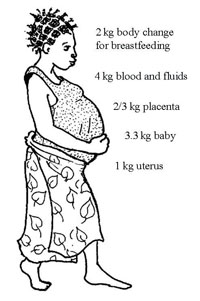3.2 Nutrition during pregnancy and lactation
An unborn child needs a healthy and well-nourished mother to grow properly. Therefore, a mother needs to gain weight during pregnancy to help nourish her growing baby. Women who do not gain enough weight often have babies that weigh too little (low birth weight). A baby weighing less than 2.5 kg has an increased chance of both physical and mental health problems. It may also suffer more from infection and malnutrition compared with babies of normal weight. The increased requirement of nutrients during pregnancy and lactation is shown in Box 3.1.
Box 3.1 Increased nutrients required during pregnancy
Increased requirements: energy, protein, essential fatty acids, vitamin A, vitamin C, B vitamins (B1, B2, B3, B5, B6, B12, folate), calcium, phosphorus, iron, zinc, copper and iodine.
Women should gain at least 11 kg during pregnancy (Figure 3.1). If the mother gains less than this, the baby’s chances of survival and health declines. If a mother is overweight, she still needs to gain for her baby’s health. She should not try to lose weight while she is pregnant.
3.1 Why it is important to know nutritional requirements

